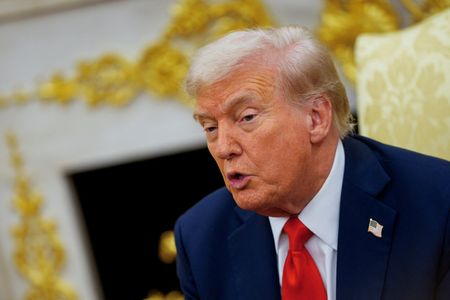By Andrea Shalal and David Lawder
WASHINGTON (Reuters) -The International Monetary Fund on Tuesday said putting pressure on central banks to lower interest rates “always backfires,” warning that erosion of trust in monetary authorities could de-anchor inflation expectations.
The IMF’s chief economist, Pierre-Olivier Gourinchas, said the global lender was observing increasing pressures on central banks to lower interest rates, but did not name any specific countries.
He said the loss of trust in central banks could have negative consequences for efforts to keep inflation expectations in check, a lesson learned in the past by advanced and emerging economies.
“Trust in central banks helps anchor inflation expectations, and this credibility needs to be protected. As trust erodes, inflation and inflation expectations always rise, macroeconomic stability deteriorates and everyone loses out,” he told reporters at the annual meetings of the IMF and World Bank in Washington.
Economists and investors have expressed concern in recent months about attacks on the independence of the U.S. Federal Reserve.
U.S. President Donald Trump has repeatedly urged the U.S. central bank to slash interest rates, deriding the leadership of Fed Chair Jerome Powell and seeking to fire one of its policymakers, Lisa Cook. Trump also nominated the head of the White House’s Council of Economic Advisers, Stephen Miran, to serve out the term of former Fed Governor Adriana Kugler through January.
Cook is fighting Trump’s effort to fire her, with her lawyers telling the U.S. Supreme Court that granting the president’s request “would eviscerate the Federal Reserve’s longstanding independence, upend financial markets and create a blueprint for future presidents to direct monetary policy based on their political agendas and election calendars.”
The Bank of England weighed in with its own concerns last week, warning that a “sudden or significant change in perceptions of Federal Reserve credibility” could result in a sharp repricing of U.S. dollar assets, including in U.S. sovereign debt markets.
The IMF had warned in its previous global economic outlook in July that any loss of central bank independence could undermine efforts to keep inflation expectations in check, potentially triggering a wave of financial, monetary and macroeconomic instability.
(Reporting by David Lawder and Andrea Shalal; Editing by Chizu Nomiyama and Paul Simao)











